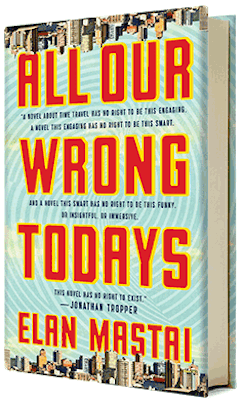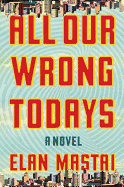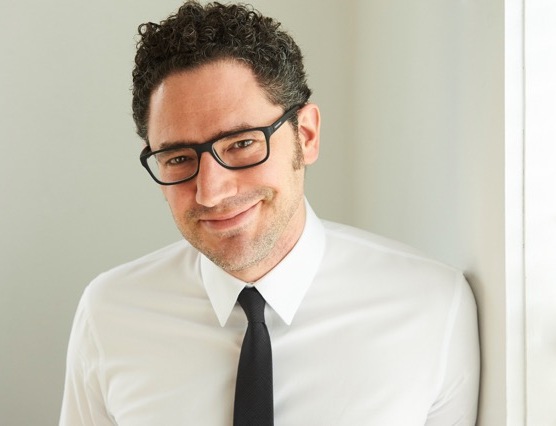All Our Wrong Todays
by Elan Mastai
All Our Wrong Todays is a funny time-travel romp all about consequences. Debut novelist Elan Mastai is preoccupied with the French philosopher Paul Virilio's notion of the Accident: "the idea that every time you introduce a new technology, you also introduce the accident of that technology, so you have a responsibility to anticipate not just the good it can do but also the bad it can wreak...." So, when Mastai introduces time travel into his novel he doesn't just use it as a clever plot device, he follows the logical ramifications of the invention all the way down into the personal lives of his characters.
Aside from time travel, the invention All Our Wrong Todays is most concerned with is the (fictional) Goettreider Engine. The novel begins in an alternate present that feels very much like the future, thanks to an invention created on July 11, 1965 by the scientist Lionel Goettreider. His Engine somehow harnesses the rotation of the Earth to produce "unlimited, robust, absolutely clean energy." Tom Barren, the protagonist of the novel, exists in a techno-utopian version of 2016 built on the back of Goettreider's miraculous invention. On his Earth, the most wildly optimistic dreams of 1950s pulp science fiction authors have been realized, and the "future" bears more than a passing resemblance to The Jetsons.
Which is not to say that Barren's life is perfect. In fact, at the start of the novel, he's feeling quite aimless. Trapped in the shadow of his father's cold scientific genius and haunted by the death of his mother in a freak hovercar accident, Barren can't seem to find a place for himself in a world where "almost nothing is asked of you." Despite its myriad wonders, Barren's Earth can feel more than a little impersonal, not to mention strange: "...in my world, when you break up with someone, it's considered gracious to offer the person you dumped a lock of hair so that, if they want, they can get a genetically identical surrogate grown for whatever purposes they need to get over you." And Barren himself is far from perfect: "I spent my postcollegiate decade coasting, resenting the opportunities that came my way because of my father while simultaneously not pursuing any other opportunities. I'm aware that this isn't an endearing quality in an adult human...."
Barren's father tries to give him some direction by employing him as a chrononaut in his experiments in time travel. The plan is to go back to July 11, 1965, and witness the unveiling of the first Goettreider Engine. But through a tragic sequence of events, Barren finds himself accidentally disrupting the crucial test and preventing his own reality from ever being born. Barren is pulled back to the present--our present--which to his eyes resembles nothing less than a dystopia: "I'm in the same world you're in.... Dull, vapid, charmless, barely evolved from the 1965 I just left."
Mastai is clever and self-aware in how he mines Barren's outsider status for humor. He writes:
"I wish I had more of a sense of humor about all the, like, fish-out-of-water hilarity as I try to fit into this backward mess you call a civilization. Of course, there's something absurd about an adult human who doesn't know how to open a jar of peanut butter or work an elevator or use a credit card. To an outside observer, I probably look like I'm suffering from some debilitating cognitive trauma.
Conscious decisions are hard. It takes forever to choose an outfit and I end up in a pair of suspiciously tight denim pants and what I later learn is a pajama top."
At the same time, though, Barren is a keen observer of our era's failings. At one point, he's called on to give a speech on architecture (really, the plot is very difficult to summarize) and he delivers a somewhat pompous, somewhat truthful takedown of society's limited imagination: "We are failures.... We've failed ourselves and we've failed the world. Architecture is the art we live in. And we could be living in miracles. Instead of dull boxes. Instead of geometry."
From here, it starts to get a bit complicated, but Mastai, an experienced screenwriter, makes sure to ground his story with clear emotional stakes. All Our Wrong Todays, like Andy Weir's The Martian, manages to respect the reader's intelligence without overwhelming with scientific mumbo-jumbo. The humor helps--Barren's terrible mistake is followed by an entire chapter of a repeated four-letter word--as do the multiple love stories that form the heart and soul of the novel.
Barren even has a charming habit of communicating directly with the audience that flirts with breaking the fourth wall: "I can't write like this. It's fake. It's safe. The third person is comforting because it's in control, which feels really nice when relating events that were often so out of control." It's an effective strategy to endear the audience to a character who makes a lot of mistakes. As the story progresses, the intimacy that these passages foster keeps the reader invested in Tom's growth as a person. For all its philosophical musings, All Our Wrong Todays is actually a very human story about a chronic screw-up finding his place in a screwed-up world. --Hank Stephenson







